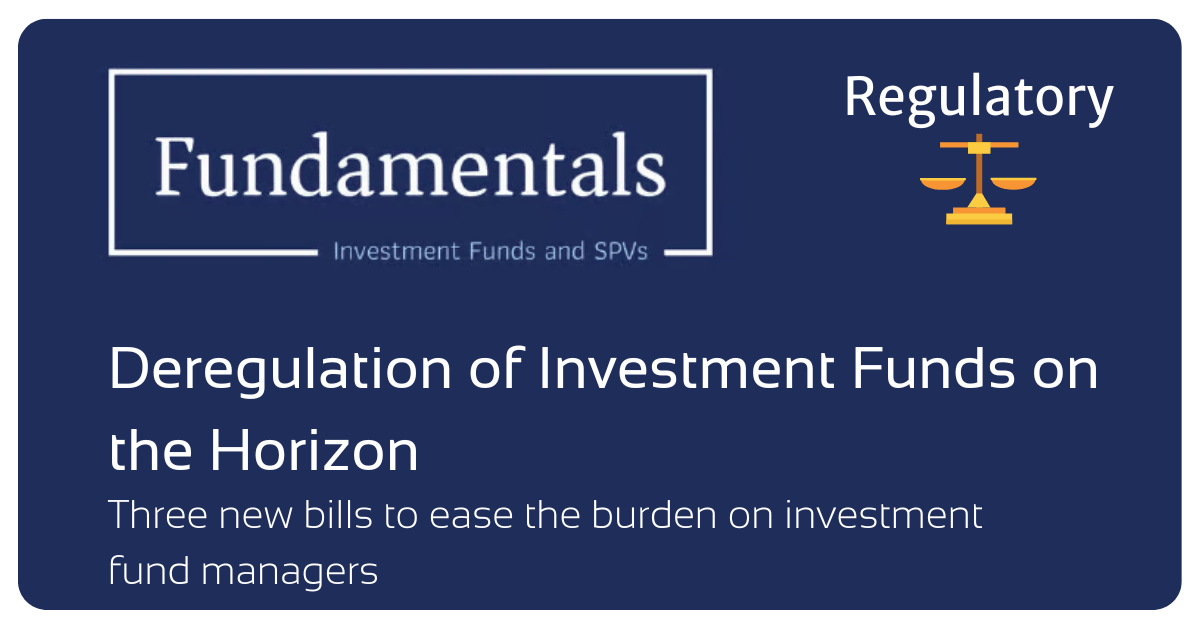- Fundamentals
- Posts
- ⚖️ Deregulation of Investment Funds on the Horizon
⚖️ Deregulation of Investment Funds on the Horizon
Three new bills to ease the burden on investment fund managers

🎉 Happy Friday, Funds Family!
Today, we’re going to discuss three new laws that would make it easier for emerging managers.
Recently, investment fund regulation has been on the chopping block:
Private Fund Rules - dead 💀
Corporate Transparency Act - dead/postponed 💀
Enhanced KYC/AML requirements - dead/postponed 💀
And now…three more potential waves of deregulation.
But first…
/ SELF PROMOTION

If you’re a sponsor (GP) raising an investment fund or syndication in private equity, private credit, real estate, or venture capital, we may be a good fit for you. We also represent limited partners (LPs) investing in funds and syndications.
Thanks for reading, now let’s jump into the article 😃
1️⃣ 𝗛.𝗥. 𝟯𝟲𝟳𝟯 – 𝗦𝗺𝗮𝗹𝗹 𝗕𝘂𝘀𝗶𝗻𝗲𝘀𝘀 𝗜𝗻𝘃𝗲𝘀𝘁𝗼𝗿 𝗖𝗮𝗽𝗶𝘁𝗮𝗹 𝗔𝗰𝗰𝗲𝘀𝘀 𝗔𝗰𝘁
Current law: Under the ⚖️ Investment Advisers Act, managers with less than $150M in AUM who advise only private funds can avoid SEC registration as investment advisers.
The issue: The $150M threshold has been in place since 2010 and hasn’t been adjusted for inflation.
What the bill does: Indexes the AUM threshold to inflation, starting with a one-time catch-up adjustment and then updating annually.
Why it matters: If you’re managing under $150M and relying on the private funds exemption, this would give you more capacity to grow without triggering SEC registration.
2️⃣ 𝗛.𝗥. 𝟰𝟰𝟯𝟭 – 𝗜𝗺𝗽𝗿𝗼𝘃𝗶𝗻𝗴 𝗖𝗮𝗽𝗶𝘁𝗮𝗹 𝗔𝗹𝗹𝗼𝗰𝗮𝘁𝗶𝗼𝗻 𝗳𝗼𝗿 𝗡𝗲𝘄𝗰𝗼𝗺𝗲𝗿𝘀 (𝗜𝗖𝗔𝗡) 𝗔𝗰𝘁
Current law: Some smaller VC funds can avoid being treated as “investment companies” under the ⚖️ Invetment Company Act if they raise less than $12M and stay under 250 investors. This is pursuant to the 3(c)(1) exemption.
The catch: Those thresholds cap your growth and limit participation, especially if you’re taking smaller checks from a broad LP network.
What the bill does: Raises the limit to $150M and expands the investor cap from 250 to 2,000.
Why it matters: If you’re relying on the “qualifying venture capital fund” exception under 3(c)(1), these changes would let you raise more capital and include more LPs without requiring registration as an investment company.
3️⃣ 𝗛.𝗥. 𝟰𝟰29 – 𝗗𝗲𝘃𝗲𝗹𝗼𝗽𝗶𝗻𝗴 𝗮𝗻𝗱 𝗘𝗺𝗽𝗼𝘄𝗲𝗿𝗶𝗻𝗴 𝗼𝘂𝗿 𝗔𝘀𝗽𝗶𝗿𝗶𝗻𝗴 𝗟𝗲𝗮𝗱𝗲𝗿𝘀 (𝗗𝗘𝗔𝗟) 𝗔𝗰𝘁
Current law: To qualify for the VC fund exemption under the Advisers Act, you generally need to make primary investments directly into operating companies. You 𝘤𝘢𝘯 make other types of investments (like secondaries or other funds), but up to a maximum of 20% of the fund or SPV.
The catch: Secondary purchases and fund-of-funds positions don’t count as “qualifying investments,” so they eat into your 20% basket. Also, secondaries SPVs are out of the question if you want to rely on the VC exemption.
What the bill does: Expands the definition of “qualifying investment” to 𝘪𝘯𝘤𝘭𝘶𝘥𝘦 secondaries and investments in other VC funds.
Why it matters: This gives you more flexibility to build diversified portfolios (including secondaries and other funds) without losing exempt status under the VC exemption.
🐎 Hold your horses
As a reminder…these aren’t laws yet (so don’t get too excited yet!), but we’ll be monitoring their progress as they wind through the hedge maze of Capitol Hill.
Thanks for reading, everyone.
Have a great weekend! 🙌
/ WRAPPING THE CASE
 |
|
Thanks for reading, everyone.
Have a great weekend! 🙌
/ JURY TRIAL
How did you like today's post? |
Have you enjoyed this newsletter? Don’t forget to share it with your GP, Co-GP, LPs, or anyone else you think might find it valuable!
You can also propose a topic that you would like us to cover! Just reply to this email or submit your suggestions 🔗 here.
⚠️ Note: This newsletter is for informational purposes only and nothing should be considered legal advice. For that, hire a lawyer! I am a lawyer, but not your lawyer (unless I actually am your lawyer because you’ve signed an engagement letter and we’re working together). This newsletter may be considered attorney advertising.
Reply